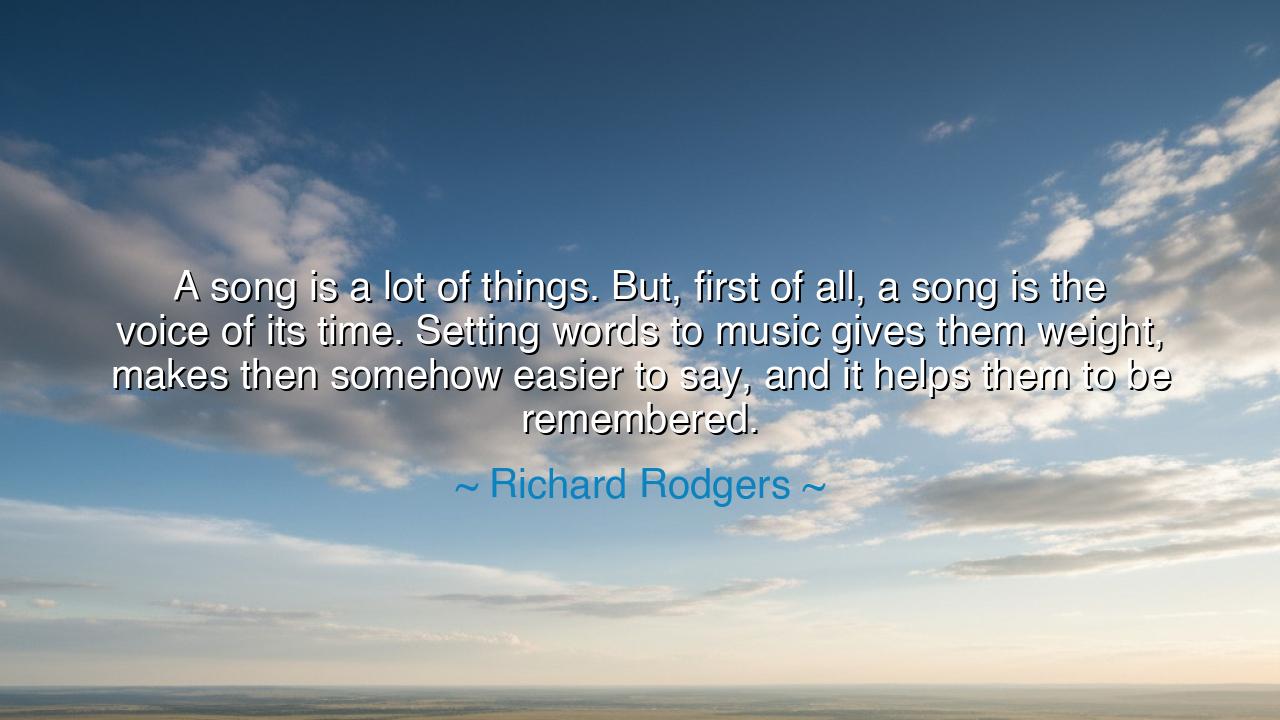
A song is a lot of things. But, first of all, a song is the
A song is a lot of things. But, first of all, a song is the voice of its time. Setting words to music gives them weight, makes then somehow easier to say, and it helps them to be remembered.






The master of melody, Richard Rodgers, once declared: “A song is a lot of things. But, first of all, a song is the voice of its time. Setting words to music gives them weight, makes them somehow easier to say, and it helps them to be remembered.” In these words, he captured the eternal power of song—not merely as entertainment, but as testimony, as a vessel of memory and truth. For while the spoken word may fade into silence, the song carries it further, planting it deep in the heart where it endures across generations.
The ancients knew this well. The bards of Greece, the griots of Africa, the psalmists of Israel—all understood that to set words to music was to give them wings. A simple sentence might be forgotten, but sung aloud, it was etched into the soul. Thus entire histories, lineages, laws, and prayers were preserved in melody. Rodgers, standing in this same tradition, reminds us that every age has its voice, and that voice is carried most powerfully through its songs. A song becomes the voice of its time, bearing witness to the struggles, the joys, the longings of those who lived it.
Consider the spirituals sung by enslaved Africans in America. These were not merely songs; they were cries of pain, prayers of hope, codes of survival. Sung in fields and churches, their words gained power through music—“weight,” as Rodgers says—and their truth was remembered even when the singers themselves were silenced. Later generations, hearing those melodies, understood not only history but the very heartbeat of a people. This is the essence of Rodgers’ teaching: music does not just carry words, it magnifies them, giving them immortality.
Rodgers himself lived through times of great change, and his songs became woven into the fabric of American life. When he wrote for the stage—Oklahoma!, Carousel, South Pacific, The Sound of Music—he did not only create melodies; he captured the spirit of the people. His songs addressed themes of love, war, prejudice, and hope, giving voice to both private longing and public conscience. Through music, his words gained resonance, echoing not only in theaters but in the memories of entire generations.
There is also wisdom here about the nature of human expression. Many truths are difficult to speak plainly—truths of grief, love, injustice, or longing. But music gives courage, softening the sharpness of words and carrying them where ordinary speech cannot go. A soldier may not be able to describe his fear, but he can sing it. A people may not dare to protest openly, but they can raise their voices in song. In this way, music makes words easier to say, and harder to forget.
The lesson is clear: honor the songs of your time, for they are its true history. Do not dismiss them as fleeting, for they carry the spirit of the age in a way no book or speech can capture. Just as the ballads of war, the hymns of faith, the anthems of nations endure long after events have passed, so too will the songs of today tell the story of now. To listen deeply is to hear the pulse of an era; to create faithfully is to leave a legacy for the future.
Practically, this means giving space for music in your life—not just as background noise, but as living memory. Listen to the songs that move you and ask what truth of your time they carry. If you are called to create, let your own songs speak with honesty, for one day they may bear witness to your generation. And if you cannot sing or play, still lift your voice, for every human carries music within, and it is through this music that our words gain weight and endure.
Thus, let Richard Rodgers’ words endure as a guide: a song is the voice of its time, giving weight to words and preserving them for generations. Live with awareness of this power, and let music not only fill your ears but shape your heart. For through song, the fleeting becomes eternal, and the silent becomes heard.






AAdministratorAdministrator
Welcome, honored guests. Please leave a comment, we will respond soon